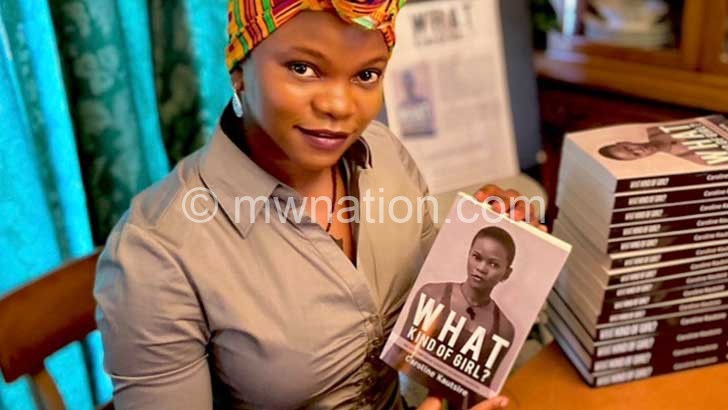Writing about life experiences
Thirty-three year-old Caroline Kautsire has written a memoir of her life depicting how she grew up in a polarised Malawian society. The book, What Kind of Girl? is out and available on different online platforms. Our reporter YVONNIE SUNDU spoke with Kautsire who is an English Professor at Bunker Hill Community College and Bay State College in Boston, USA on the book and her love for writing.

Q
: Tell us about your writing journey. How did all this begin?
A
: The truth is that all through high school, I was terrible at writing. When I moved to America, I started enjoying literature, which helped me develop my writing. There is a chapter on this in the book.
But I really only began to write seriously when I was 27 years old.
I was feeling very empty after living in America for many years. I decided to visit Malawi after seven years absence. When I was suddenly exposed to the land, the people and culture again, I remembered that I had a voice and story to tell. So, I started documenting my experiences in Malawi. The seeds for this novel began on a blog I called Athena Tales.
In the blog, I would write all my thoughts about being a Malawian who lives in America. I then enrolled at Emerson College as a Creative Writing major, and I started publishing poetry and flash fiction. That is also where I started writing this memoir.
Q
: Please unpack this story about a Malawian girl who takes risks and faces difficult challenges as she tries to understand her identity in Malawi while being influenced by American and British cultures?
A
: What Kind of Girl? is about how I grew up facing the impossibility of fulfilling both African and Western roles for females. I was an adventurous girl who was always setting out to conquer new worlds on my own.
The memoir explores tensions regarding body image. For me, the expected behaviour for girls was often difficult to execute, and so, I aspired to be accepted in my own terms.
Whenever I acted like a tomboy or rejected a tradition for girls, there were questions like what kind of girl behaves this way?’ and ‘What kind of girl are you?’ These questions increased my insecurity about gender, race, class, language and sexuality and sometimes made it even harder for me to behave the way I was expected to.
Through childhood and adolescence, my struggle to both fit in and stand out as a strong and talented Malawian girl led me, first, to taking ever escalating risks. Then, when I became alienated from our traditions, I started to live in an imaginative world of music, drama and American television, which actually helped me start a journey that the book depicts.
Q
: What do you intend to achieve through the book?
A
: The purpose of this book is to connect cultures and widen an audience’s understanding about the realities of African life, while chronicling the struggle of my attempts to reconcile the contradictions that global culture created in my life.
I hope that through my experience—my Malawian and American readers will be awakened to the diverse communities within their countries as well as the uniqueness of African identity. Readers will also learn about Malawian culture and tradition and see how Malawians deal with poverty, class and gender.
Young Caroline’s story is meant to resonate with the stories of other girls around the world who may be struggling to come to terms with their own identities. The book portrays Africa not as a ‘Third World’ stereotype, but as a real place with real families. It is important to see the tragedy of stolen girls in Nigeria and of young women facing sexual assault in Sudan, but it is also of high importance that young women know these are not the only stories about girls in Africa.
If we are to truly learn compassion for people around the world, we need to be able to see them not as victims but as people like ourselves. The book will show how I, in my awkward adolescence, dealt with the idea of what is traditionally feminine in a culture where femininity is a value.
It will allow readers to learn about the food, clothing and traditional celebrations of Africa through description, humour, and anecdotes.
One of my favourite things is that it will introduce readers to the beauty of words and sayings in Malawi’s Chichewa language, with quotes and phrases woven throughout the text that are also explained in English, as much as that is possible.
It is my hope that in the end, my story will awaken people to their own coming-of-age experiences and inspire questions such as, ‘What kind of person have I chosen to be?’ or ‘What kind of person am I becoming?’
Q
: Do you believe writing has saved many? Would you say the same about yourself?
A
: Writing is therapeutic, and it has helped me process a lot of what happened to me as a child. It has helped me accept my more traumatic experiences as ‘life-shapers,’ circumstances that helped me grow up and continue on my journey.
I also believe that writing is a learning process. I learn how to take in the world and understand things as I write. To me, writing is the process of working out one’s deepest thoughts, and it is a process that is more about acquiring knowledge than dispensing it. So, writing has helped me to think clearly.





